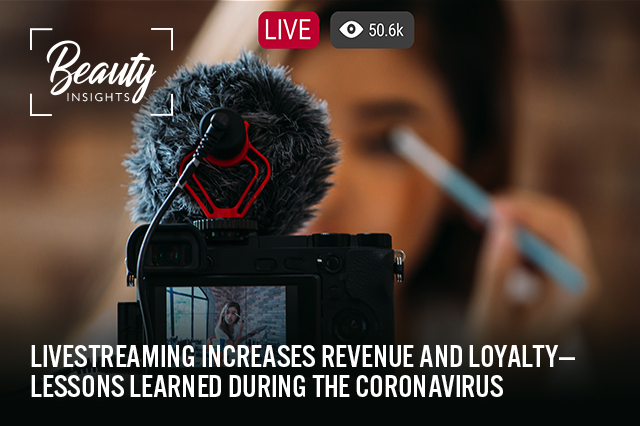
Nitheesh NH
The beauty industry has typically been a leader in digitally engaging with consumers and effectively using social media influencers. However, the coronavirus pandemic has necessitated even greater personal outreach to consumers by brands and retailers to form deeper connections through digital channels. This is because many retailers are facing revenue losses of 60–80% due to temporary store closures.
Livestreaming is only beginning to be recognized as an effective marketing tool globally—we outline the benefits of this channel to retailers in Figure 1 and discuss examples of each in this report. The coronavirus pandemic has further highlighted some lessons that beauty brands can learn from the use of this digital channel in China.
[caption id="attachment_108224" align="aligncenter" width="700"]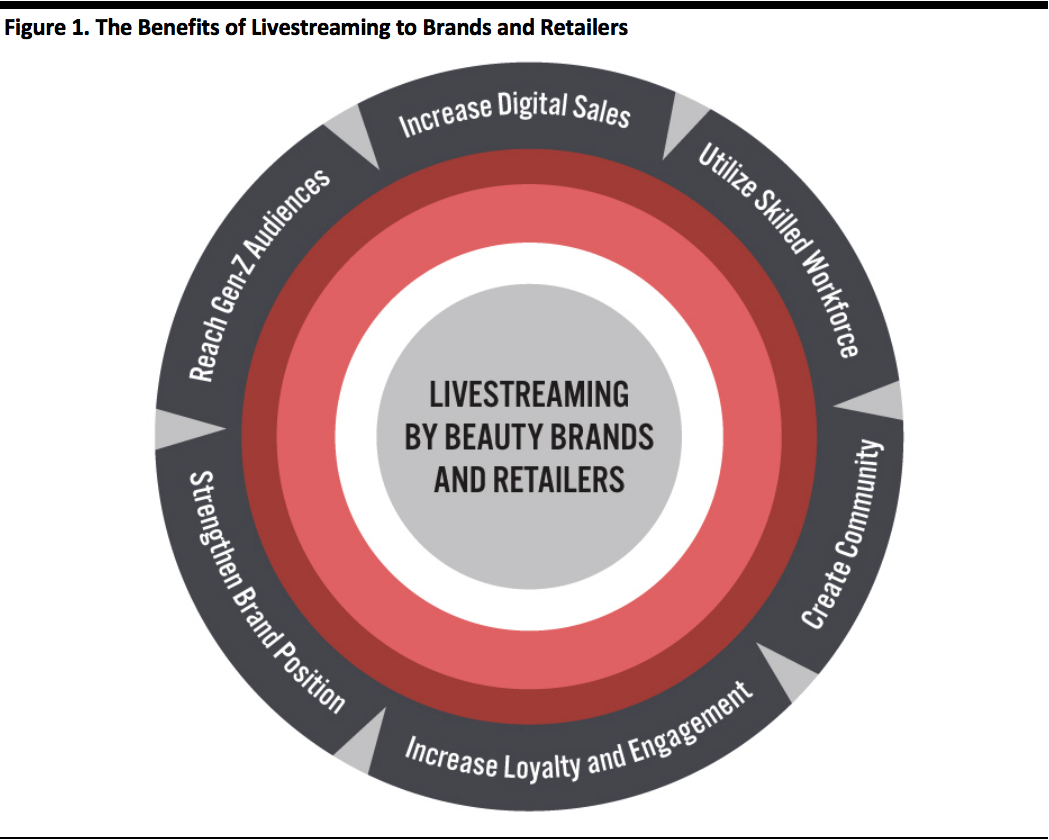 Source: Coresight Research[/caption]
Source: Coresight Research[/caption]
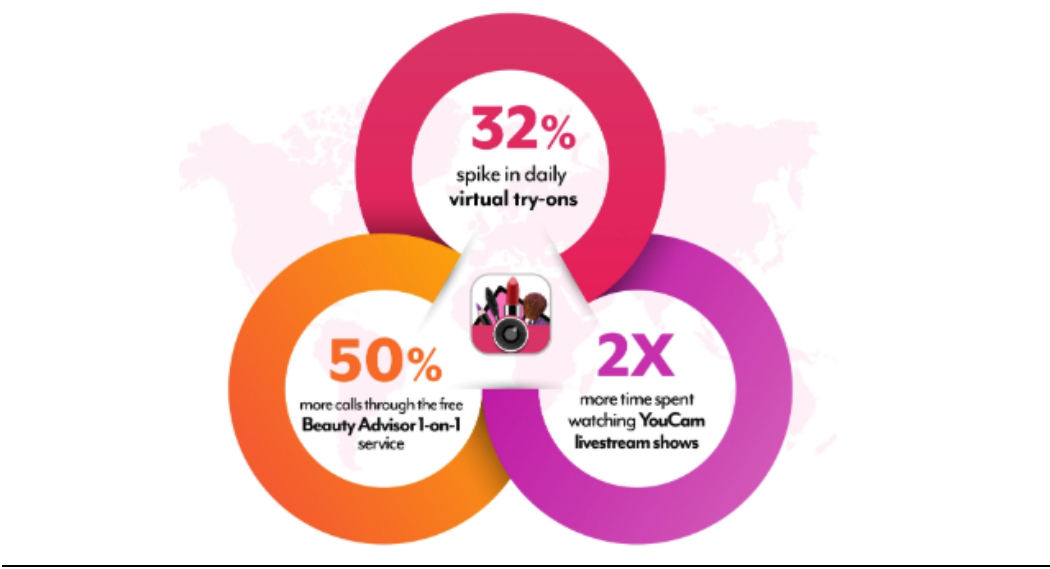 Source: Company reports[/caption]
Lesson: Consumers are interested in learning about new beauty products and want to become subject matter experts, particularly among their peer groups. Experiential content such as beauty tutorials for products that consumers can actively follow—rather than simply watch—is proving appealing. Beauty brands should look to reach out to consumers to increase engagement.
Source: Company reports[/caption]
Lesson: Consumers are interested in learning about new beauty products and want to become subject matter experts, particularly among their peer groups. Experiential content such as beauty tutorials for products that consumers can actively follow—rather than simply watch—is proving appealing. Beauty brands should look to reach out to consumers to increase engagement.
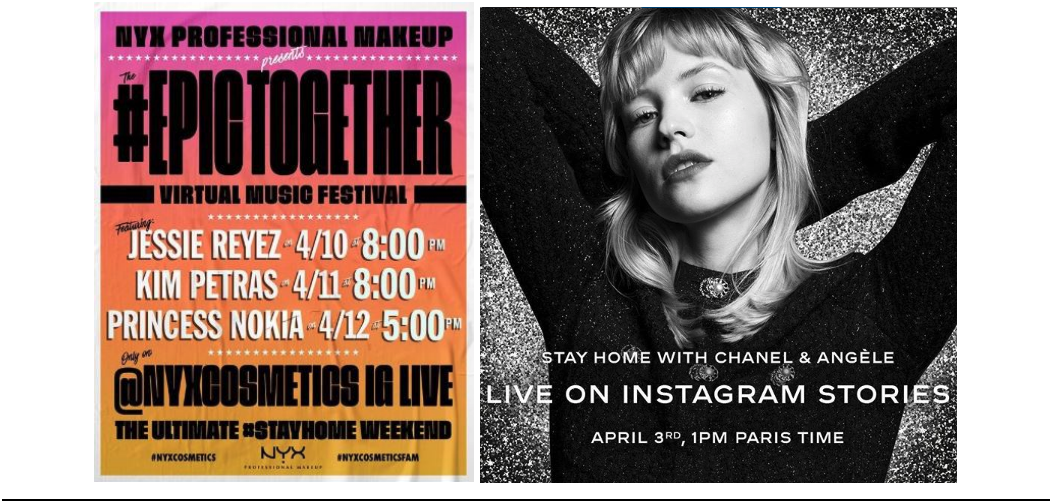 Source: Companies/Instagram[/caption]
Lesson: Brands and retailers could branch out beyond traditional content to reach consumers. By collaborating with a new artist, musician, author or creative in a tangential space that aligns with a brand’s positioning, beauty companies can enable consumers to connect with the brand through unconventional means.
Source: Companies/Instagram[/caption]
Lesson: Brands and retailers could branch out beyond traditional content to reach consumers. By collaborating with a new artist, musician, author or creative in a tangential space that aligns with a brand’s positioning, beauty companies can enable consumers to connect with the brand through unconventional means.
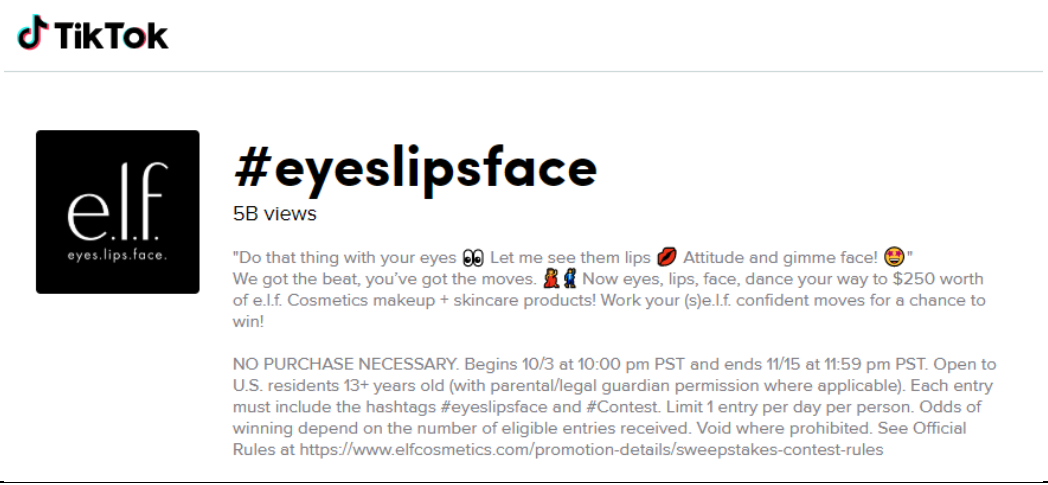 Source: Elf Cosmetics #EyesLipsFace challenge[/caption]
Beauty influencers are also creating their own beauty brands on TikTok, which may also create viral moments and help to produce more consumer engagement. Most recently, the Gloss Twins, Shanae and Renae Nel, announced the launch of their lip gloss collection on the platform on March 29, 2020. The 19-year-old twins have 1.2 million followers on TikTok and 21.4 million likes.
In an interview with online publication Tubefilter on April 14, 2020, the Nels said that TikTok is “a great platform, because it never gets boring. There is always something new or something trending, and everybody can’t help but get on board and start creating.”
[caption id="attachment_108228" align="aligncenter" width="280"]
Source: Elf Cosmetics #EyesLipsFace challenge[/caption]
Beauty influencers are also creating their own beauty brands on TikTok, which may also create viral moments and help to produce more consumer engagement. Most recently, the Gloss Twins, Shanae and Renae Nel, announced the launch of their lip gloss collection on the platform on March 29, 2020. The 19-year-old twins have 1.2 million followers on TikTok and 21.4 million likes.
In an interview with online publication Tubefilter on April 14, 2020, the Nels said that TikTok is “a great platform, because it never gets boring. There is always something new or something trending, and everybody can’t help but get on board and start creating.”
[caption id="attachment_108228" align="aligncenter" width="280"]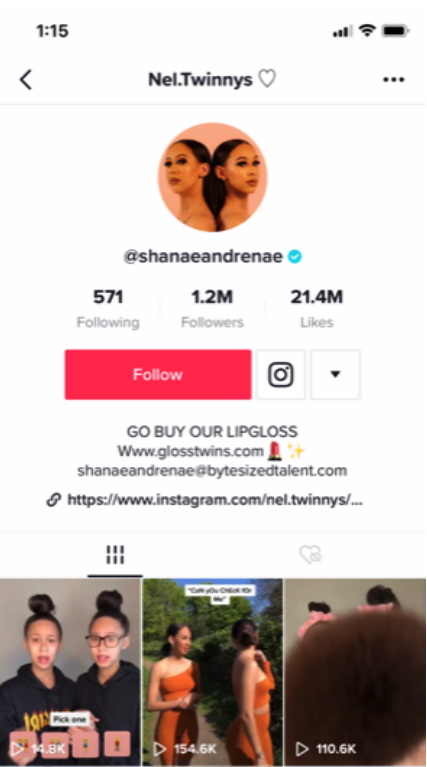 Source: TheGlossTwins/TikTok[/caption]
Lesson: TikTok is an engaging and popular social media platform, particularly among Gen-Z consumers. Beauty brands and retailers can leverage this channel as a marketing opportunity—a beauty product, beauty influencer, brand challenge or hashtag can go viral at any time, boosting brand awareness.
Source: TheGlossTwins/TikTok[/caption]
Lesson: TikTok is an engaging and popular social media platform, particularly among Gen-Z consumers. Beauty brands and retailers can leverage this channel as a marketing opportunity—a beauty product, beauty influencer, brand challenge or hashtag can go viral at any time, boosting brand awareness.
 Source: Coresight Research[/caption]
Source: Coresight Research[/caption]
Consumer Engagement with Livestreaming in China Translates to Sales for Brands
Brands are able to build stronger relationships with consumers through livestreaming by establishing a network of micro-influencers that entertain or educate consumers about their products, as well as by hosting digital events, flash sales and challenges. In China, the livestreaming industry is booming. According to Alibaba, over 400 million users watched over 60,000 livestream shopping shows on Taobao in 2019; hosted by brand stores or influencers, these sessions generated ¥200 billion ($28 billion) in total. On Singles’ Day 2019, Taobao Live generated ¥20 billion ($2.85 billion), accounting for approximately 7.5% of the total day’s revenue. On March 30, 2020, Taobao reported at the Ecosystem Summit in Hangzhou that “Taobao Live provided a lifeline to many brands during the height of the Covid-19 pandemic in China.” According to Alibaba, the number of new merchants utilizing Taobao Live for the first time increased by 719% in February 2020 compared to January 2020. Taobao Live reported that gross merchandise volume grew by approximately 150% for three consecutive years. The company expects this trend to continue, as livestreaming viewership has remained high even as business begins to return to normal in China. Lesson: Consumers are engaging with livestreaming content, which is resulting in conversion to sales for retailers and brands of all types.Transitioning Associates from Brick-and-Mortar Stores into Digital Beauty Advisors Increases Customer Loyalty and Online Sales
Forest Cabin Cosmetics, (Lin Qingxuan) is a high-end skincare brand that was founded in 2003 and has over 2,000 employees and 300 stores in China. In January 2020, over half of these stores were temporarily closed due to the coronavirus pandemic; sales fell by 90%. Approaching bankruptcy within two months, the brand created an enterprise community platform utilizing DingTalk (Alibaba’s enterprise communication and collaboration app), through which each of its sales associates became digital brand shopping advisors. They began using livestreaming on Taobao to engage with customers and offer promotional coupons. Forest Cabin Cosmetics hosted a large-scale livestreaming shopping event on Valentine’s Day 2020, which involved over 100 of the brand’s digital advisors. According to Alibaba’s news arm, Alizila, more than 60,000 people watched one two-hour livestream session, during which the company sold more than 400,000 bottles of camellia oil. According to Alibaba, Forest Cabin’s sales increased by 120% year over year in February 2020, once it began livestreaming. The company also began adding 3,000 new loyalty members a day, up from the average of 800 to 1,000 people. Now, the online channel represents 90% of the brand’s sales, compared to just 25% prior to its livestreaming/outreach initiatives triggered by the coronavirus pandemic. Lesson: Retailers should look to leverage the talents and customer connections of its existing teams when creating livestreaming content and engaging with shoppers online—this should save costs and build a community around the brand. By transitioning its store associates to digital shopping advisors who leveraged livestreaming to promote the brand, Forest Cabin Cosmetics added three times more loyalty members per day on average than it did before launching this digital strategy.Gaining Viewership through Experiential Livestreaming Content
Perfect Corp is a global artificial intelligence and augmented reality beauty tech solutions provider and the parent company of YouCam Makeup. The company reported on April 9, 2020 that its virtual beauty app had seen a 200% increase in viewership of livestream beauty tutorials during the coronavirus outbreak. In addition, the company revealed that recent YouCam Makeup user behavior data from the end of March showed a 32% increase in daily virtual try-ons and 50% more calls through its free “Beauty Advisor 1-on-1” service, compared to the beginning of February. In the same press release, Perfect Corp announced that it is offering beauty brands complimentary product listings within the YouCam Makeup app for up to 100 SKUs. [caption id="attachment_108230" align="aligncenter" width="700"] Source: Company reports[/caption]
Lesson: Consumers are interested in learning about new beauty products and want to become subject matter experts, particularly among their peer groups. Experiential content such as beauty tutorials for products that consumers can actively follow—rather than simply watch—is proving appealing. Beauty brands should look to reach out to consumers to increase engagement.
Source: Company reports[/caption]
Lesson: Consumers are interested in learning about new beauty products and want to become subject matter experts, particularly among their peer groups. Experiential content such as beauty tutorials for products that consumers can actively follow—rather than simply watch—is proving appealing. Beauty brands should look to reach out to consumers to increase engagement.
Strengthening Brand Identity and Building Communities by Launching New Creative Content
Beauty brands are becoming more creative and branching out beyond traditional platforms and traditional content to reach consumers. For example, two beauty brands each engaged customers using live performances on Instagram during the coronavirus pandemic. NYX Cosmetics hosted a “virtual music festival” on Instagram, leaning into its brand identify to target Gen-Z consumers. The digital concert was held from April 10 to 12; NYX Cosmetics marketed it as “the ultimate #stayhome weekend.” Performers included singer-songwriters Jessie Reyez and Kim Petras, and rapper Princess Nokia. On April 3, Chanel hosted a live performance on its Instagram stories by Angèle, a Belgian singer, using the hashtag #LiveWithChanel. Amid the ongoing coronavirus crisis, Chanel used the social media platform to promote the brand and engage with consumers, while encouraging them to stay at home. [caption id="attachment_108226" align="aligncenter" width="700"] Source: Companies/Instagram[/caption]
Lesson: Brands and retailers could branch out beyond traditional content to reach consumers. By collaborating with a new artist, musician, author or creative in a tangential space that aligns with a brand’s positioning, beauty companies can enable consumers to connect with the brand through unconventional means.
Source: Companies/Instagram[/caption]
Lesson: Brands and retailers could branch out beyond traditional content to reach consumers. By collaborating with a new artist, musician, author or creative in a tangential space that aligns with a brand’s positioning, beauty companies can enable consumers to connect with the brand through unconventional means.
Reaching Gen-Z Consumers and Launching New Products
Experimenting and being creative on video-sharing and social networking platforms such as Tiktok and YouTube can help brands to reach Gen-Z consumers: 60% of TikTok US viewers are aged 16–24 and spent an average of 52 minutes a day on the app in 2019; and more than 81% of US YouTube views come from 15–25 year olds. TikTok is increasingly becoming a “beauty go-to” for livestreaming due its functionality—viewers can comment on videos and chat with each other. YouTube, on the other hand, is popular for its ability to create longer-form video livestreams. According to our proprietary survey on US social commerce, 51.5% of consumers who use social media as part of the shopping process discover or research beauty, grooming, personal care or fragrance products through these platforms, and 41.3% use social media to purchase these products. Through livestreaming, beauty brands, retailers and influencers can create and share content such as the following:- Beauty challenges
- Product launches
- Beauty tutorials on how to apply beauty products
- “Beauty haul” videos of the top beauty products to buy
- Beauty hacks
- Beauty news
- DIY content
- Health and wellness information
 Source: Elf Cosmetics #EyesLipsFace challenge[/caption]
Beauty influencers are also creating their own beauty brands on TikTok, which may also create viral moments and help to produce more consumer engagement. Most recently, the Gloss Twins, Shanae and Renae Nel, announced the launch of their lip gloss collection on the platform on March 29, 2020. The 19-year-old twins have 1.2 million followers on TikTok and 21.4 million likes.
In an interview with online publication Tubefilter on April 14, 2020, the Nels said that TikTok is “a great platform, because it never gets boring. There is always something new or something trending, and everybody can’t help but get on board and start creating.”
[caption id="attachment_108228" align="aligncenter" width="280"]
Source: Elf Cosmetics #EyesLipsFace challenge[/caption]
Beauty influencers are also creating their own beauty brands on TikTok, which may also create viral moments and help to produce more consumer engagement. Most recently, the Gloss Twins, Shanae and Renae Nel, announced the launch of their lip gloss collection on the platform on March 29, 2020. The 19-year-old twins have 1.2 million followers on TikTok and 21.4 million likes.
In an interview with online publication Tubefilter on April 14, 2020, the Nels said that TikTok is “a great platform, because it never gets boring. There is always something new or something trending, and everybody can’t help but get on board and start creating.”
[caption id="attachment_108228" align="aligncenter" width="280"] Source: TheGlossTwins/TikTok[/caption]
Lesson: TikTok is an engaging and popular social media platform, particularly among Gen-Z consumers. Beauty brands and retailers can leverage this channel as a marketing opportunity—a beauty product, beauty influencer, brand challenge or hashtag can go viral at any time, boosting brand awareness.
Source: TheGlossTwins/TikTok[/caption]
Lesson: TikTok is an engaging and popular social media platform, particularly among Gen-Z consumers. Beauty brands and retailers can leverage this channel as a marketing opportunity—a beauty product, beauty influencer, brand challenge or hashtag can go viral at any time, boosting brand awareness.
Key Lessons Learned and Actionable Beauty Insights
- Although livestreaming is only beginning to be utilized to its full capabilities outside of China, the coronavirus pandemic has caused brands and retailers to focus on digital engagement with consumers as stores are temporarily closed. Livestreaming is a lucrative tool for brands to access the following benefits: increasing digital spend, expanding loyalty, creating community, leveraging team talent, increasing consumer product knowledge and building closer customer connections.
- Consumers are engaging in livestreaming content, which is driving orders for brands of all types. To tap into the livestreaming channel, beauty brands should take the necessary steps to determine the product(s) they want to promote, the related content and a campaign strategy.
- By connecting with consumers through livestreaming, brands can attract new loyalty members (tripling in the case of Forest Cabin) and drive digital spend, particularly during the current coronavirus-related retail shutdowns.
- Brand should harness existing team talent and customer connections when creating digital content. Passionate associates and their clients are a retailer’s/brand’s most valuable asset. Forest Cabin leveraged its stores associates and trained them to become digital shopping advisors and livestreaming hosts.
- Beauty tutorials for products are popular among younger consumers who want to be “first beauty adopters” and are interested in becoming beauty subject matter experts. Beauty brands and retailers should reach out to consumers to introduce them to new product launches, attributes and features through tutorials and livestreaming in order to increase audience engagement while sharing new product knowledge.
- Brands could branch out beyond traditional content to reach consumers, such as by collaborating with a new artist, musician, author or creative in a tangential space that aligns with their brand positioning. NYX Cosmetics held a virtual music festival and Chanel hosted a musician on Instagram, both of which were strategies intended to strengthen the brand while engaging consumers.
- New platforms or challenges can be used to launch products and campaigns, particularly if the target audience is Generation Z. For example, Elf Cosmetics had the “most influential” campaign on Tiktok in 2019, according to Adweek.